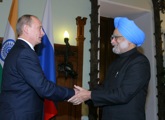The Western illusion of soft power

Fast food chains like McDonalds and Burger King (pictured above) are seen as symbols of American soft power. Source: RIA Novosti / Vladimir Fedorenko
When Russian diplomat Dmitry Peskov remarked at the G20 summit in St Petersburg that Britain is ‘‘just a small island” and “no one pays any attention to them’’ it caused outrage in Britain and sniggers around the world.
Peskov’s zapper not only reveals the hollowness of British influence – which is to a large extent dependent on its alliance with the United States – it also raises a pertinent question: is “soft power” really the key to winning hearts and minds?
The term soft power was coined by professor Joseph Nye of Harvard University in a 1990 book, Bound to Lead: The Changing Nature of American Power, to describe the ability to attract and co-opt rather than coerce, use force or give money as a means of persuasion. Nye further developed the concept in his 2004 book, Soft Power: The Means to Success in World Politics.
According to Nye, there are three ways nations wield power – by intimidation, bribery and persuasion by the force of attraction, the last one being what he calls soft power. Nye is convinced American culture, its values, political ideals, and its socio-economic model are overwhelmingly superior to those of, say, Russia and China, and universally attractive.
Not everyone concurs. Author and analyst Dmitry Mikheyev says if that is true what explains the rise of anti-Americanism on a global scale, even among members of the Western alliance?
Calculus of power
It is ironic that the godless, dictatorial and communist Soviet Union had more influence and admirers around the world than today’s democratic Russia. Back in the 1970s and 80s, Soviet friendship clubs were ubiquitous in a lot of developing countries. For instance, in India not just the hardcore socialist states such as Kerala and West Bengal but also the fully capitalist ones like Andhra Pradesh had Indo-Soviet friendship clubs down to the village level. Today they are all gone.
So what changed? Russian military power did. As long as Russia was regarded as a superpower that could eyeball the United States, it was cool to wear a hammer and sickle clip. People around the world signed up for Russian language classes, the elites of Libya and Iraq sent their children to study in Moscow, and Russia was widely respected.
So basically, it was Russia’s military might that filled up university classrooms teaching Dostoevsky; it wasn’t Dostoevsky’s writings that attracted people to Russia.
Another good comparison is Japan vs China. Japan is the world’s leading donor, and its products – everything from automobiles to home electronics – are available in every country. And yet nobody aspires to visit Tokyo or learn Japanese. Few countries want to ally themselves with democratic Japan. In fact, Peskov could have been easily describing Japan.
On the other hand, communist China’s rise to superpower status has won it friends and admirers around the world. In sync with the rise of China’s economic and military power, Mandarin is increasingly popular in universities around the world.
Gilbert Doctorow, Research Fellow of the American University in Moscow, says soft power is a byproduct of wealth and success. “America’s undisputed power of attraction to peoples around the world (when it is not invading hapless countries) has more to do with its per capita GDP than with any other factor,” he says.
“This explains the passion of ambitious people everywhere to send their children to American colleges, whatever their ratings. It explains the popularity of Hollywood and pop culture and much more. There is nothing wrong with this; it is all understandable in human terms. But it has relatively little to do with vibrant civil society or any beacon of human rights radiating from Washington, DC. In this respect, the best thing Russia or China can do to further their soft power is to get richer quick.”
Russia: A different sort of power
Now that the world is no longer polarised around the United States or Russia, and doesn’t have to choose between the democratic West and totalitarian East, people have a lot more choices. In this soft power free market, Russia has an advantage.
For starters, Russia has never claimed racial or religious exclusivity. This means a big deal to countries such as India where Abrahamic values clash with the local – in this case, Hindu – ethos. Mikheyev elaborates: “While Western branches of Christianity emphasise austerity, fear of God and intellectualism, Russian Orthodox Christianity emphasises love, beauty, harmony and moral perfection. While the angry Protestant God sends down to Hell all but the chosen few, the Orthodox God loves all human beings, including the sinners. While Western Christianity drums up the imminent apocalyptic destruction of mankind, Russian Orthodoxy promises salvation of the world in unity with the loving God.”
Mikheyev adds that when the best Anglo-Saxon minds were labouring on the theory of Social Darwinism – according to which the world is an arena of mortal competition for scarce resources where only the strongest survive – the Russian intelligentsia defended the people from the Tsarist regime.
Take Russian literature. At the time when Rudyard Kipling and Turner glorified violence and war as manifestations of manliness and spiritual health, the Russian poets called for mercy toward the weak and miserable. When Theodore Roosevelt called peace “ignoble” and “slothful," Tolstoy and Dostoevsky condemned the horrors and idiocy of war and revolution.
The norm, Mikheyev says, is not the “clash of civilizations” which is supposed to end with the triumph of the most vigorous and fittest of all. Cultures not only must coexist; they can benefit from mutual learning and enrichment.
Charm offensive
Remember Jackson Pollock? In the 1950s and 60s the CIA secretly funded abstract artists such as Pollock to draw attention away from Social Realism, a style which focussed on social issues. It is highly likely the CIA has its 21st century Pollocks inserted in universities, academia and the media to influence global opinion in a way that is favourable to the United States. Is it working? A big no! Despite the pervasive influence of Hollywood, Coke and McDonalds, the United States can’t seem to get anything done without using old-fashioned military – hard – power.
This approach has predictably backfired on the United States. Back in 2004, at a New Delhi global round table attended by the likes of Richard McCormack, former US under-secretary of state, Stephen Solarz, former United States Congressman, and Lt Gen Satish Nambiar, former head of the UN peacekeeping force in Yugoslavia, Xi Laiwang, director and research professor at the China Institute of Contemporary International Relations, told me that the public perception of the United States in China was “quite bad” and the image of the Ugly American surfaced frequently.
Across the Atlantic, the Chevening scholarships are part of Britain’s charm offensive to gain cronies globally, especially in the media. Who knows if it’s paying off for Britain but it’s certainly not working for India, where the Chevening journalists have ushered in mind-numbing mediocrity.
At any rate, despite retaining the apparatus of empire and the worldwide acceptance of English as the link language, Britain’s global influence is melting faster than a snowflake in the Sahara.
On the other hand, Russia’s People’s Friendship University scholarships – which were overtly for propaganda purposes during the Cold War days – are now generating genuine goodwill in places as diverse as Africa and Europe.
In closing, with all that “soft power” at their disposal, you’d think Western domination would be overwhelming. And yet it is the age of Western impotence.
All rights reserved by Rossiyskaya Gazeta.
Subscribe
to our newsletter!
Get the week's best stories straight to your inbox


